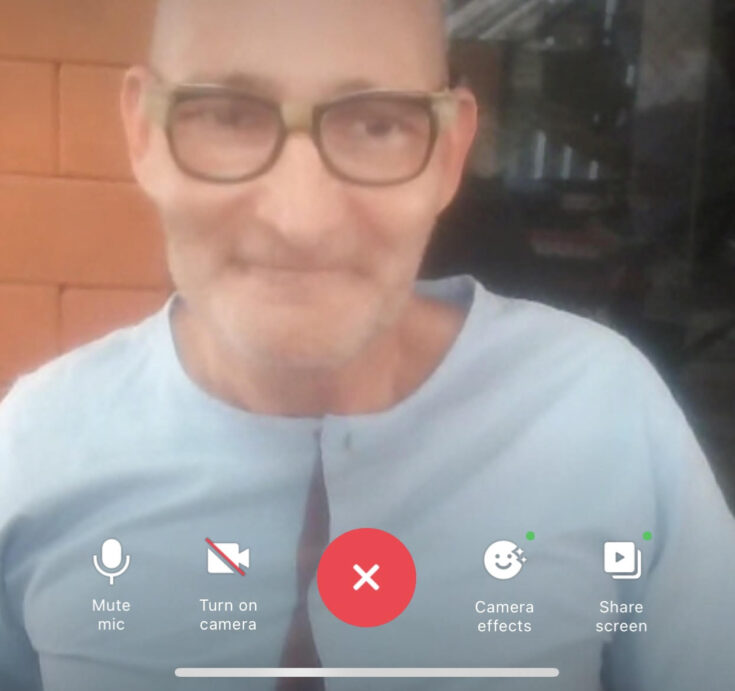
As I step into the visiting room, I find myself lost among the sea of faces, trying to locate him. Even amidst the limited number of white men, or ‘farangs’ as they are referred to in Thailand, it is difficult to spot him through the thick glass separating visitors from those serving time. After a swift scan, we lock eyes, and with a warm and inviting smile, he eagerly signals me over.
John Finn Ørsted Meyer Jensen doesn’t attempt to portray himself as a saint. He honestly and openly admits his mistakes, although he believes that they may not be as grave as they have been portrayed.
Fell into a trap
“I fell into a trap. No doubt about it. I was incredibly naive, but back in Denmark, something like this would never have happened. There, you’d actively have to approach potential customers for a sale. What transpired here was far from that scenario,” he states. His voice resonating over the old, stationary phone. His recognizable bald head faintly shines behind the smudged glass, with the light gray-painted steel bars in the middle.
The story has circulated across numerous media outlets: the narrative of the 51-year-old Dane apprehended in Pattaya for attempting to distribute “Ice,” as John Finn calls it. A substance more commonly known as Methamphetamine or Crystal Meth. What remains untold, however, is the story of how an undercover agent, a foreign man named Philip, approached him during his routine grocery shopping in a Foodland in Pattaya.
“Philip approached me in Foodland and persistently pestered me to sell him Ice. Initially, I declined, but after relentless requests, I mentioned I might have some friends who could assist. So, I exchanged ‘Line’ details with him and promised to get back. Three days later, I did just that,” John continues.
Sealing his fate at Starbucks
This led to the infamous Starbucks meeting, where the Dane’s fate was sealed after being arrested for drug possession with intent to sell. A fateful moment that has John sitting in Pattaya Remand Prison today, serving his third year, with a total sentence of 14 years and four months.
“At first, I was sentenced 28 years and 8 months. If I accepted the verdict, the sentence would be halved. I was then down to 14 years and 4 months, which the police appealed, hoping I would get a harder punishment. Instead, I ended up with 5 years and 7 months after the appeal,” he shares.
“The first three days I spent in the Safehouse. That’s where you get interrogated,” John reveals, unable to delve into the specifics due to legal constraints.
“But the rules governing interrogations in Thailand are vastly different from those in Denmark,” he adds. “The police can do almost whatever they want here,” John adds.
“With the sentence reduction due to amnesty regulations and the possibility of being transferred to one’s home country, I had anticipated returning to Denmark back in March. Yet, I’m still here. The process is supposedly ongoing, but it’s hard to say how long it will take. So, I’ve stopped hoping. Hope doesn’t do you any good in here.”
Alone among hundreds of men
John, however, envisions the conclusion of his time in Pattaya prison. With the reduction in his sentence and another one on the horizon in the summer of 2024, he anticipates having 10-11 months left to serve.
Upon release, he faces deportation back to Denmark, as he will be banned from Thailand for the next 99 years.
“I have two children here, aged 11 and 4. I can apply to have the ban reduced because of them,” he shares.
However, he has no contact with either the children or their mothers today. Neither has his children back in Denmark or their mothers reached out to him. In the slightly over three years he has spent in prison, no one except his sister has been in contact with him.
“We don’t talk anymore, though,” he says.
“I had hoped she would help me raise money for bail, but it didn’t work out. She just kept complaining about losing the apartment I had provided for her here in Thailand. She kept demanding that I’d get her a new one. But what am I supposed to do from here? I have nothing. I’ve lost everything. And all she could do is pity herself and complain. In the end, I had to cut ties. It brought me nothing but increased stress and sadness.”
Despite the tough exterior he has developed, the absence of contact from family and friends is evident as he gazes down at the table in front of him and takes a deep breath.
When loyalty is a core value
When John was initially arrested, he was asked to name his friends who, according to his own account, had supplied him with the drugs he was apprehended with. He has steadfastly denied giving up names from the very beginning. Even though not a single person has visited him during the three years he has spent in prison – nor has there been any inquiry.
“Back home in Denmark, I also have friends who owe me money. Friends I’ve done a lot for. But now that I need help, I am completely alone. And it’s incredibly challenging to be alone in a place like this,” he shares.
Apart from the three daily meals served in prison, one of the trials of being alone has been that provisions still cost money to acquire in prison. Money that John Finn doesn’t have when there’s no one to support him.
“Presently, the Danish Church in Thailand assists me. The church provides me with 500 baht a month for necessities. Prior to that, the prison provided me with a tube of toothpaste and a bar of soap annually, which was quite extraordinary. Nevertheless, it’s not hard to imagine how challenging it is to make a tube of toothpaste last an entire year,” he remarks, with a small smile.
John then emphasizes his gratitude towards Christa, the Danish vicar in Thailand, for her support.
“She is my lifeline. My connection to the outside world. I cannot thank her enough for what she has done for me,” he shares, with a genuine gratitude, and the hint of tears in his eyes.
The place where dreams must die
What gets him through this challenging time is his routine and keeping himself from dreaming.
“The first year was the hardest. Now, I’ve adapted to the rhythm. I’ve established a routine, and I know how to navigate it. I always keep my head down,” he shares, with a shadow of concealed sadness flickering in his eyes.
His day starts at 5:55 AM when his Norwegian friend wakes him up. After that, he packs up his “bed” – a bed consisting of a mat with a blanket on a concrete floor among 40 other men. An upgrade from his first cell, where they were 200 men.
“Having a mat and blanket to sleep on is also an upgrade. The first year and a half, I didn’t have a blanket to sleep on, so I would just lay down on the cement floor,” he says.
Every man has three blankets that make up his “bed”. One to lie on, one to cover themselves with, and one to fold and use as a pillow.
Despite the minor upgrade, the layout of the cells is the same. All the men lie side by side on their respective blankets, with the open toilets situated in the middle of the room. Privacy does not exist here.
“It’s challenging to use the restroom facilities in front of everyone else. Even out in the yard, the toilets are open. People will walk by and cast unwarranted stares,” he says.
When every day is the same
At 6:30 AM, they are let out of the cell and allowed a shower. In the communal shower area, hundred men stand in rows. Each person has a mere two minutes to rinse off, followed by three minutes to soap up, and then another two minutes to rinse off once more. After this brief window, the water supply is cut, and the next group enters for their turn.
Breakfast starts at 6:45 AM and is divided into four rounds. John belongs to the second round, which means he has his breakfast from 7:00 AM until his round concludes at 7:15 AM.
By 8:00 AM, there’s a morning assembly featuring the Thai national anthem and the king’s song, followed by a prayer to Buddha. The rest of his morning and early afternoon take place in the covered courtyard, since foreign prisoners are not allowed to work.
“As a foreigner you are not allowed to work as the rest of the prisoners, which means, that there is really not much for us to do all day” he explains.
In-between inmates
In the courtyard, there are 600 prisoners and only four guards. To make it work, the guards have delegated some of the responsibility to the inmates.
“When it’s time for medication, it’s not a guard who hands it to you; it’s another prisoner. Here, most interactions are between inmates,” he explains, his words leaving much unsaid. However, his eyes convey the unspoken truth. Even through the distorted lens of the thick glass, the bars, and his scratched glasses.
Lunch rounds begin at 11:30 AM. Meanwhile, the prisoners are counted every day at 12 PM. Dinner follows swiftly, starting as early as 1:45 PM, followed by another brief period in the yard before they pack up their “houses” at 3 PM. The rest of the day is spent in the open cell with the noise of Thai soap operas blasting from the television.
“I don’t speak Thai, so there’s not much entertainment for me. Generally, there isn’t much entertainment around here when you don’t understand Thai,” he says with a sadden expression. His gaze dropping to the table In front of him.
To pack up your “house”?
“Packing up house” signifies clearing one’s designated area in the courtyard. This involves folding one’s blanket and organizing the meager possessions one has managed to acquire. Additionally, one’s “house” refers to a prisoner’s social circle or “gang” in prison – the group of people they associate with.
“Foreigners and Thais don’t really mingle. There are some Thai ‘houses’ consisting of up to 30 men. In my case, we are only three people in my house: me, a Pakistani who speaks English, and my Norwegian friend. We can speak Danish and Norwegian together, but most of the time, we converse in English. That’s just the cultural norm here,” he states, unable to disclose more on the topic.
However, he does reveal how he often spends his days lying on his blanket, with his warn out grey beanie, that he clutches between his hands as he talks, covering his face. This way, he appears as if he’s sleeping, ensuring that no one disturbs him – a situation he prefers.
“It’s important to understand that many Thai people have a more stable life inside prison than they do outside. There isn’t the same fear of consequences that you might encounter, for example, in Denmark,” he adds, shedding light on the complex dynamics of life behind bars in Thailand.
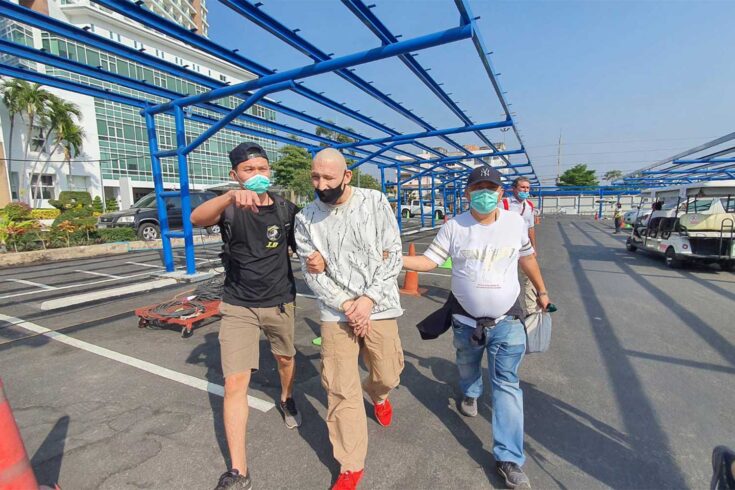
How it all started
John’s life took a turn when he moved to Thailand approximately 14 years ago, following a drug-related sentence in Denmark. A sentence he still deems unjustifiable.
“I was convicted for selling hard drugs, even though it was Weed, which isn’t considered a hard drug. Consequently, my sentence was much harsher than it should have been. I was handed 4.5 years and ended up serving 2.5 years, being released in the summer of 2007,” he recounts.
In 1994, at the age of 25, John had invested in his first gym while pursuing his engineering studies. The venture flourished, expanding to include two fitness centers, two nightclubs and a trucking company before his arrest in 2005.
“As a bouncer, you get to know a lot of people. So I ended up selling for some friends, but as I mentioned, it was Weed and not hard drugs. After that I felt unfairly treated by the system and wanted a change.”
Upon his initial release, he found employment as an engineer through the organization High Five. However, he was laid off during the 2008 financial crisis. By that time, he had already invested in his first apartment in Thailand in 2005.
Consequently, after about a year of freedom in Denmark, he made the life-altering decision to move to Pattaya.
Here, John established a construction company called Meyer Constructions. He emphasizes that this business venture contributed to his investments in multiple apartments – properties that have been the subject of controversy in the media.
Back in 2021
When John Finn was arrested in January 2021, reports claimed he owned eight apartments in Pattaya. Allegedly, these apartments were purchased with drug money. John himself confirms that he owned eight apartments in Pattaya prior to his arrest, but he firmly denies, that they were purchased with drug money.
“The apartments were investments made in connection with my construction company. Before Covid, I rented them out, but during the pandemic, the rental conditions changed. So, I leased them to groups of men who used the apartments for private parties. I had no involvement in what they brought into the apartments – whether it was alcohol, women, or drugs,” he clarifies.
Following his arrest, the apartments were searched, leading to the discovery of more drugs. However, John denies any association with these substances.
“I couldn’t tell them about the parties, cause if the authorities asked for the names of everyone involved, I wouldn’t be able to provide them, for obvious reasons,” he elaborates.
Subsequently, his apartments and all his possessions were confiscated. According to the media, assets worth over 10,690,000 baht were seized from the Dane.
“I’ve lost everything,” John exclaims with a remarkable calmness.
15 Minutes Later
During my first visit with John, a young guard approaches us and signals toward me, holding a book in his hands. I realize he’s requesting to borrow the phone I’m using to communicate with John. I hand him the phone, and I observe as he explains to John that the book, he received from the Danish priest in Thailand has been approved and will be delivered to him. The guard kindly returns the phone, flashing a smile that reveals the braces on his teeth, appreciative of my cooperation.
As the 15-minute visitation time concludes, we are asked to wrap up our conversation. John gets up from his seat, tightly clutching his old beanie between his hands. He moves slowly toward the exit, his head bowed. The beanie remains pressed between his palms, while the taped glasses, essential for his vision today though absent in all pictures from his arrest three years ago, slide slightly down his nose. In that moment, it’s difficult to believe that John is only 54 years old, walking toward the prison yard, and not a much older man heading toward the end of his life.
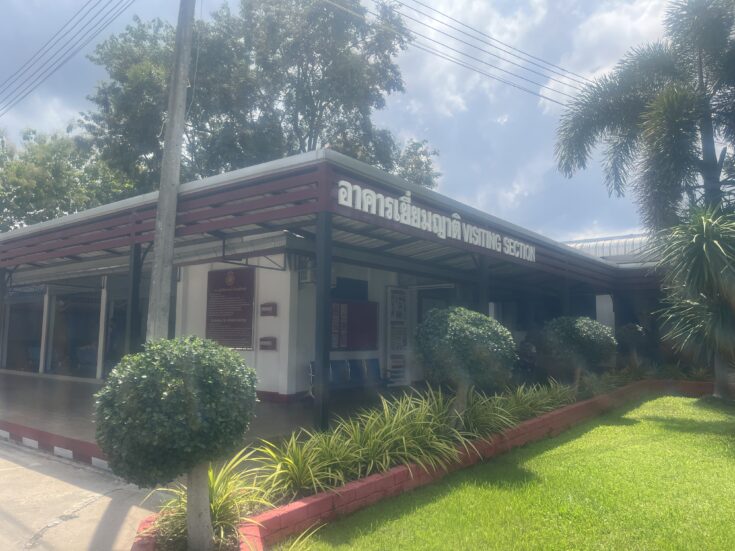

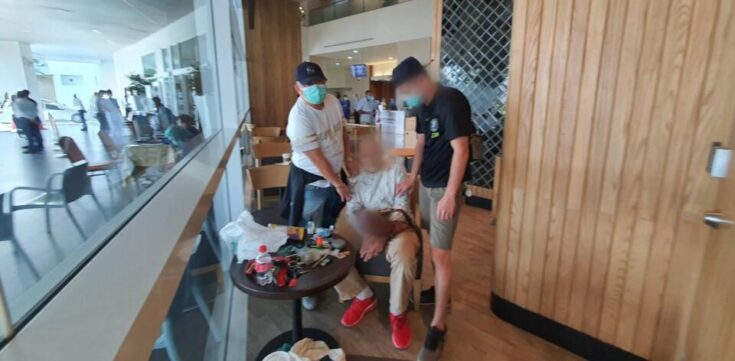
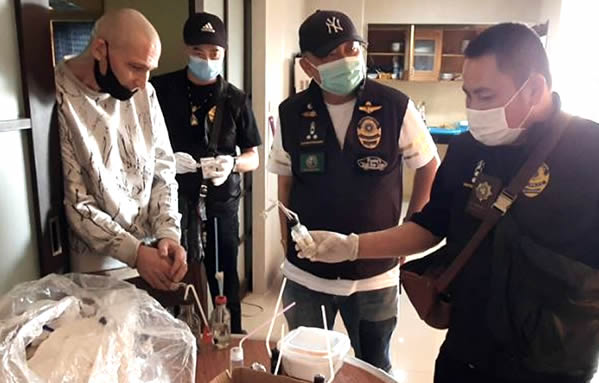
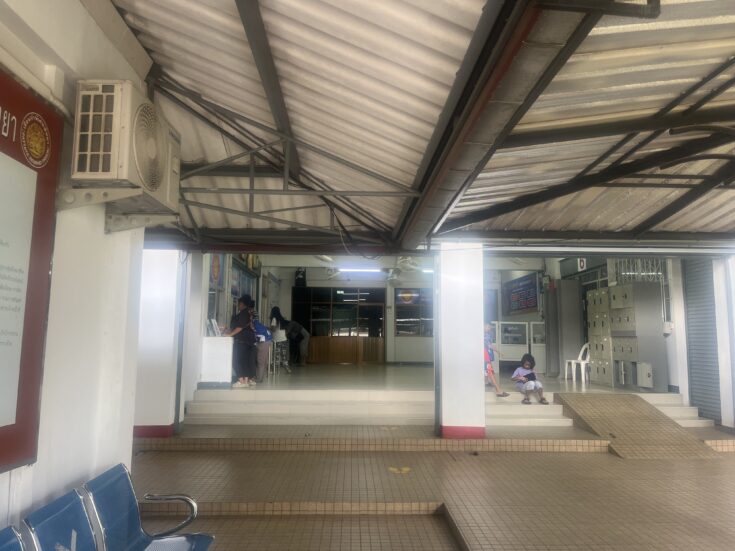
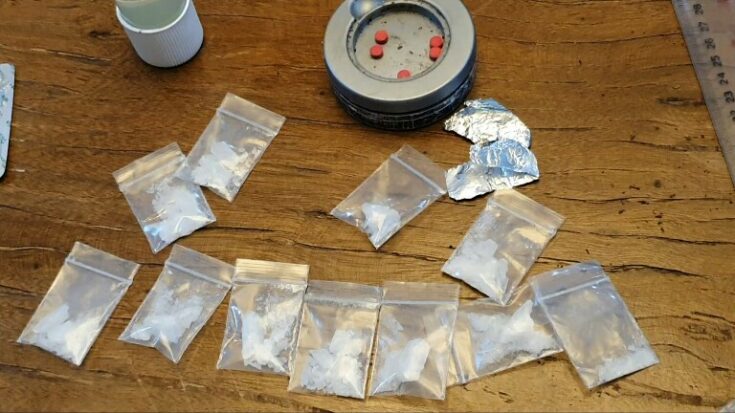


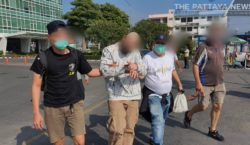

Og så er der den anden side ….Håber ikke folk ude i verden tror på alt hans gylle han har siden han kom til verden set sig selv som en konge og supermand = narcissist og psykopat hvor alt gik med store armbevægelser og løgn mm , han har taget røven på sin familie ved at snyde dem big time og hans søster som han omtaler har han snydt ved at stjæle den kontrakt og forfalsket hendes underskrift på den lejlighed, så han kunne sælge den men så det var de første penge jo også hjemme han skulle bruge til at starte sin lorte forretning op med
Ja jeg fik skaffet hjælp til ham og ved gud jeg har fortrudt det mange gange siden hans kontakt til mig gik kun ud på at jeg skulle skaffe penge ved at sælge såsom bil ,dyr mm og som han selvfølgelig ville betale tilbage men hvorfor skulle jeg dog tro på det når nu jeg ikke fik mine penge for min lejlighed som han valgte at stjæle fra mig
Alle hans børn har han aldrig taget sig a og der er ret mange , de børn har været meget igennem ved at han kom som vinden blæser eller kom som aldrig når de havde en aftale
De faldt desværre for hans narcissistiske charme selvom jeg prøvede at sige de skulle løbe imens de kunne ,men de blev fanget i hans net fuldstændig som hans familie har været det , men nu er det regnskabet time og det har konsekvenser … Det er sørme mærkeligt at der ingen hjælp er til ham fra hans såkaldte venner og familie ik
After reading this article and as a mother to one of his children, I have to say, he still feels like a victim in everything that happens to him. I don’t see him taking responsibility before his actions. He has unfortunately not changed at all. Me and my son have tried all sorts of contact through his childhood, we have been visiting many times in Thailand. But he did not want any contact. Which made my son very sad, he was aware of the lack of interest from his father.
The last we heard from John was when he wanted an unrealistic big amount for his bail, and the only times he did contact us, was when he wanted something. There is a reason why he doesn’t have any contact with family and children.. because he chose it.
I really hope when people are reading the article they think about there are to sides to a story.
After Reading the article and as a mother to one of his children, I can only say that he hasn’t change at all. Still don’t take any responsibility for his actions. He contacted me when he was taken to prison and wanted to borrow an unrealistic amount of money.
It was his decision to not have contact with his children. Me and our son have been to Thailand many times to visit him and he never had any time to spend with him. Which made my son very sad. I would never put my son through any more disappointments by him.
So yes the article shows one side but there is also another.
Reading the article and taking note of his past business activities my sense of compassion begins to diminish. However, his punishment is poignant considering the current legalization of cannabis! It is legally available on every street corner. The disgusting smell alone. Complete madness!